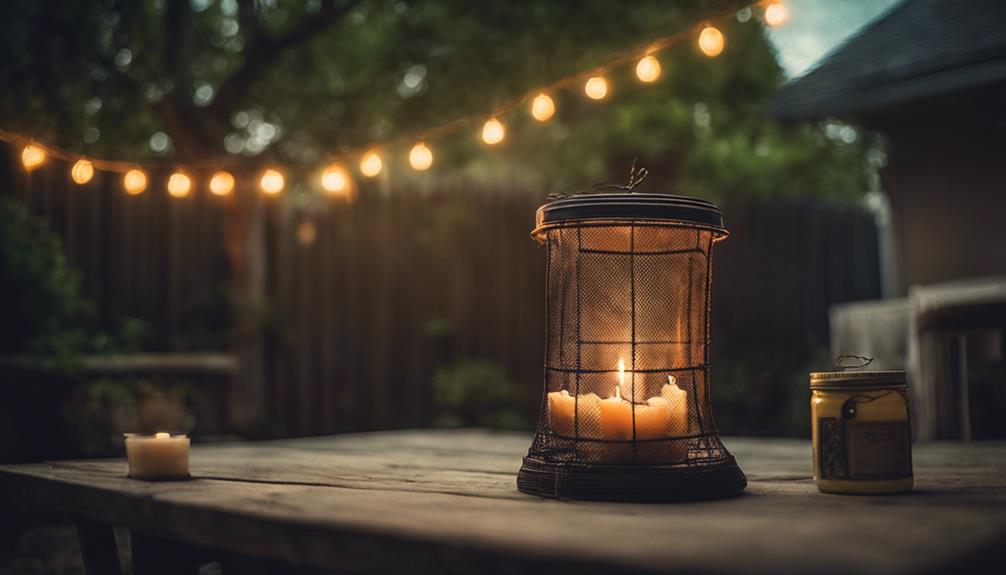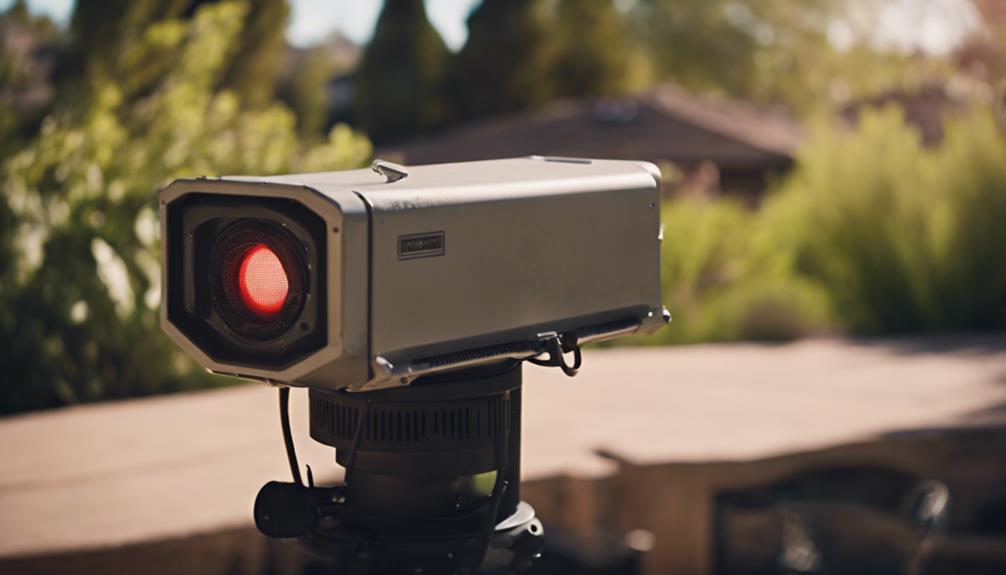Eliminate standing water to prevent mosquito breeding; eggs can be laid in a teaspoon of water. Install screens with mesh size 18×16 or smaller to keep mosquitoes out. Plant citronella, lavender, and marigolds to deter mosquitoes naturally. Adjust outdoor lights to discourage mosquitoes; consider using yellow bug lights. Maintain yard regularly, trim vegetation, and upkeep gutters to reduce mosquito habitat. Confirm rain gutters are clean and water directed away from the house. Inspect door and window screens for holes and tears, fix them promptly. Citronella plants emit scents that repel mosquitoes. Clean birdbaths weekly to inhibit mosquito breeding. More tips available.
Key Takeaways
- Eliminate standing water in flower pots, bird baths, and gutters.
- Install fine mesh screens on doors and windows.
- Plant citronella, lavender, and marigolds for natural repellents.
- Maintain outdoor lighting to deter mosquitoes.
- Keep yards clean, trim vegetation, and clean rain gutters regularly.
Standing Water Elimination
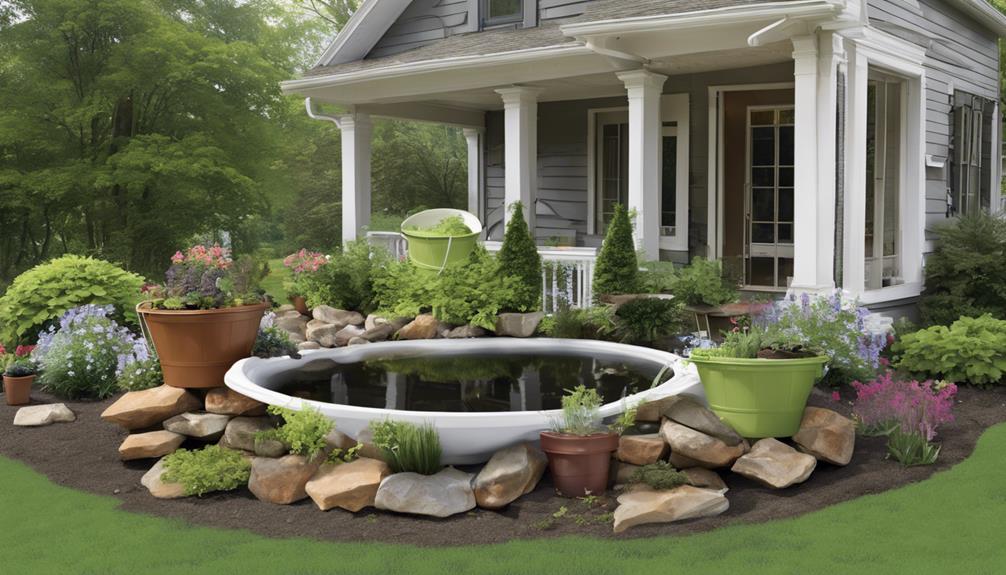
To effectively combat mosquitoes and reduce the risk of bites and diseases, you must prioritize the elimination of standing water around your property. Mosquitoes rely on standing water for breeding, making it important to address any areas where water accumulates. By removing these potential breeding sites, you can greatly impact mosquito populations and protect yourself from bites and potential diseases.
Common areas where standing water collects include flower pots, bird baths, clogged gutters, and overturned toys. Mosquitoes can lay eggs in as little as a teaspoon of water, highlighting the importance of regularly inspecting and emptying water-holding containers. This simple act can go a long way in reducing the number of mosquitoes around your home.
Screen Installation Tips
When installing screens to prevent mosquitoes from entering your home, make sure you choose a mesh size of 18×16 or smaller for peak effectiveness.
Be sure to securely fit the screens on doors and windows without any holes or tears to maintain their efficiency.
Properly maintained screens not only provide ventilation but also serve as a barrier against mosquitoes and other pests, offering a cost-effective solution to enhance mosquito prevention in your living space.
Proper Screen Selection
Selecting screens with a mesh size of 18×14 or smaller is essential for effectively keeping mosquitoes out of your home. These screens act as a barrier, preventing pests from entering through doors and windows.
Opting for tightly fitted screens without any holes or tears is vital to maintain their effectiveness. By installing screens on all windows and doors, you create a shield against mosquitoes while still allowing ventilation.
Well-fitted screens not only keep mosquitoes at bay but also deter other unwanted insects from invading your living space. Make sure to choose screens that are durable and properly sized for your windows and doors to enhance the overall pest prevention strategy in your home.
Installation Tips and Tricks
Curious about how to guarantee proper installation of tight-fitting screens on your windows and doors to effectively prevent mosquitoes from entering your home? Follow these tips to make sure your screens are installed correctly for best mosquito control:
- Check for Holes: Before installation, examine screens for any holes or tears that could allow mosquitoes to enter your home.
- Use Weather-Stripping: Seal gaps around screens and frames with weather-stripping to prevent mosquitoes from finding their way indoors.
- Regular Maintenance: Regularly inspect screens for damage and promptly repair or replace them as needed to maintain a strong barrier against mosquitoes.
Mosquito-Repellent Plants

Plant mosquito-repellent herbs like citronella, lavender, and marigolds to naturally deter mosquitoes and enhance your garden in St. George. Citronella plants are known for their insect-repellent properties due to the presence of citronellal, which helps mask scents attracting mosquitoes, making them an effective natural repellent.
Lavender not only adds a pleasant fragrance to your outdoor space but also acts as a deterrent to mosquitoes. The aromatic oils in lavender plants are known to repel insects, including mosquitoes, making them a beautiful and practical addition to your garden.
Marigolds, with their bright colors, contain pyrethrum, a natural insect repellent that can help keep mosquitoes at bay. Planting herbs like basil, mint, and lemongrass can also contribute to preventing mosquito infestations while adding aesthetic appeal to your garden in St. George.
Embracing these mosquito-repellent plants won’t only beautify your surroundings but also create a more pleasant outdoor experience free from these pesky insects.
Outdoor Lighting Maintenance
Adjusting the brightness of your outdoor bulbs and positioning fixtures strategically can help minimize mosquito attraction.
By using dimmer yellow bug lights and directing the light away from gathering areas, you can deter mosquitoes from swarming.
Taking these simple steps in maintaining your outdoor lighting can notably reduce the presence of these pesky insects around your home.
Bulb Brightness Control
When maintaining outdoor lighting for mosquito prevention, it’s recommended to use low-wattage bulbs to reduce mosquito attraction. To control bulb brightness effectively, consider the following:
- Opt for Low-Wattage Bulbs: Choose bulbs with lower wattage to emit less light that may attract mosquitoes.
- Install Motion-Sensor Lights: Use motion-sensor lights to only illuminate when needed, reducing continuous exposure that can draw mosquitoes.
- Try Yellow Bug Lights: Replace standard white lights with yellow bug lights, as they’re less appealing to mosquitoes.
Fixtures Position Adjustment
To optimize mosquito prevention through outdoor lighting maintenance, consider adjusting the position of fixtures to reduce mosquito attraction. Position fixtures in a way that directs light downward, minimizing the spread of light and decreasing the likelihood of attracting mosquitoes. Place lights away from seating areas to lower the number of mosquitoes present in outdoor spaces where people gather.
Opt for yellow bug lights or LED lights with a color temperature of 3,000K or lower to deter mosquitoes effectively. Installing motion sensor lights can also help in reducing mosquito activity by only illuminating the area when necessary.
Regularly checking and maintaining outdoor lighting fixtures is vital to make sure they’re functioning correctly and aiding in mosquito prevention efforts.
Effective Yard Clean-Up
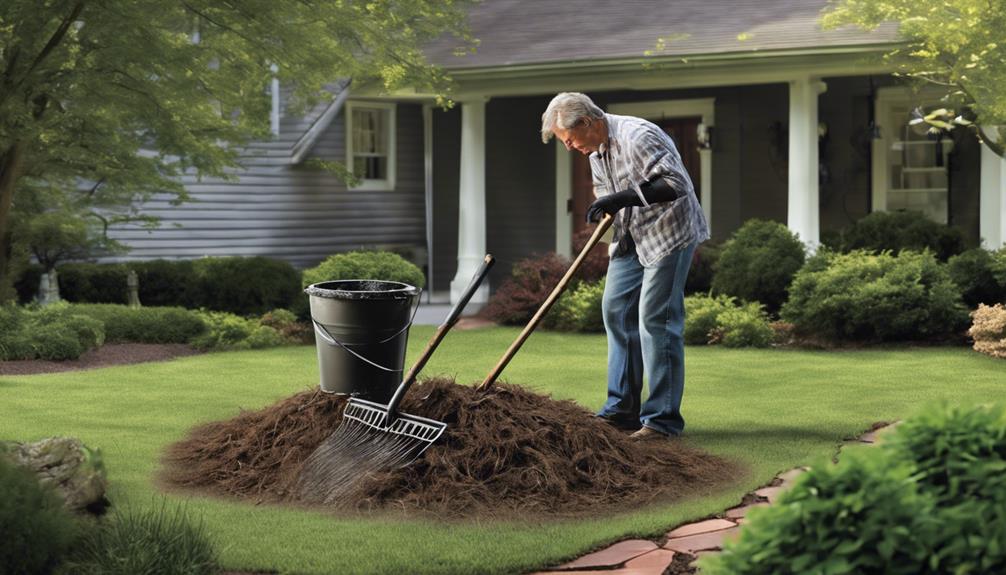
To effectively prevent mosquitoes from breeding in your yard, it’s essential to conduct thorough yard clean-up by removing any debris, old tires, or containers that can collect water. Mosquitoes use stagnant water as breeding grounds, so eliminating these sources is critical in reducing their population. Here are three important steps to effectively clean up your yard and discourage mosquito breeding:
- Remove Standing Water: Dispose of any outdoor items that can hold water, such as buckets, pots, and toys. Make sure that water doesn’t accumulate in flowerpots or other objects around your yard.
- Trim Vegetation: Trim overgrown vegetation and bushes to reduce harborage areas for mosquitoes. By keeping plants neatly trimmed, you can limit the places where mosquitoes hide during the day.
- Maintain Gutters and Drains: Regularly clean gutters and drains to prevent water accumulation, which can attract mosquitoes. Clogged gutters are a common breeding site for mosquitoes and should be addressed promptly.
Proper Rain Gutter Care
Regularly cleaning rain gutters is vital in preventing water accumulation and eliminating potential mosquito breeding grounds. Mosquitoes thrive in standing water, making clogged gutters an ideal spot for them to lay eggs.
Make sure that your rain gutters are free of debris to prevent water from pooling. Downspouts should be directed away from the house to avoid water pooling around the foundation, as this can also attract mosquitoes. Proper rain gutter care is essential for reducing standing water and minimizing mosquito populations around your home.
By keeping your rain gutters clean and well-maintained, you can greatly decrease the risk of mosquito infestations. Remember, a simple task like cleaning your rain gutters can go a long way in keeping these pesky insects at bay and creating a more comfortable outdoor environment for you and your family.
Stay proactive in managing your rain gutters to help protect your home from mosquitoes.
Window and Door Screens

For optimal mosquito prevention, make sure that your window and door screens are tightly sealed without any gaps to prevent these pests from entering your home. Here are three crucial tips to help you maintain effective window screens for mosquito prevention:
- Regular Maintenance: Check your window screens regularly for any holes or tears. Promptly fix any damage to uphold an efficient barrier against mosquitoes.
- Use Fine Mesh Screens: Choose screens with a mesh size of at least 18×14. This fine mesh will block out even the smallest mosquitoes, offering better protection for your home.
- Screen All Openings: Screen all windows and doors, including those in basements and attics. By covering all potential entry points, you create a thorough defense against mosquito intrusion.
Citronella Plant Benefits
Citronella plants, with their natural insect-repelling properties due to citronella oil, offer an effective solution for mitigating mosquito presence in outdoor spaces. The citronella oil found in these plants acts as a deterrent to mosquitoes, preventing them from lingering in the area.
Not only do citronella plants help in keeping mosquitoes away, but they also contribute to your health by reducing the risk of mosquito-borne diseases. The strong citrus scent emitted by citronella masks the odors that attract mosquitoes, making it an excellent preventive measure to keep your surroundings mosquito-free.
These plants are low maintenance, making them a convenient option for both indoor and outdoor spaces. By incorporating citronella plants into your garden or using citronella oil in diffusers, you can create a natural barrier against mosquitoes without resorting to harmful chemicals.
Embracing citronella plants not only aids in mosquito prevention but also promotes a healthier environment for you and your loved ones.
Birdbath Cleaning Techniques
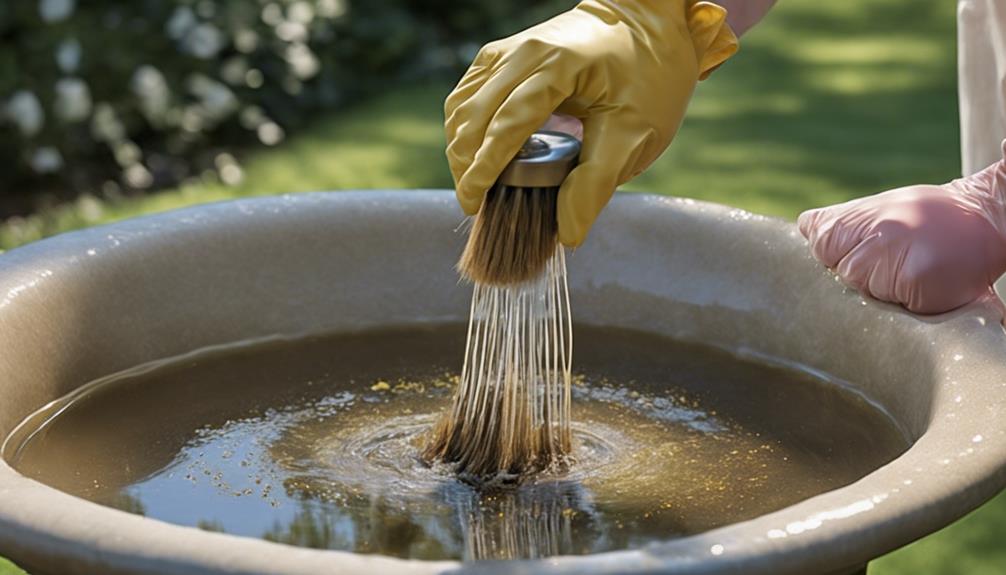
Consider implementing these effective birdbath cleaning techniques to prevent the breeding of mosquito larvae in stagnant water.
- Regular Cleaning: Scrub your birdbath on a consistent basis with a stiff brush to remove algae and debris, which can serve as breeding grounds for mosquito larvae.
- Water Replacement: Make sure to replace the birdbath water at least once a week to eliminate any potential mosquito breeding sites.
- Additional Measures: Consider adding a small fountain or pump to keep the water moving; this makes it less attractive to mosquitoes and reduces the chances of them laying eggs.
Frequently Asked Questions
What Is the Best Home Remedy to Keep Mosquitoes off of You?
To keep mosquitoes off of you, the best home remedy is using natural solutions like essential oils. Planting mosquito-repelling plants, burning citronella candles, or applying eucalyptus oil can effectively deter mosquitoes and protect you from bites.
What Smell Do Mosquitoes Hate?
Mosquitoes hate natural repellents like citronella, lavender, and garlic due to their strong scents. Aromatherapy solutions using eucalyptus, lemongrass, and citrus scents from fruits like lemons are effective at keeping mosquitoes away.
How Do I Make Homemade Mosquito Spray for My Yard?
To make homemade mosquito spray for your yard, combine essential oils like citronella, eucalyptus, and lavender with water or witch hazel in a spray bottle. Enhance repellent properties by adding apple cider vinegar or rubbing alcohol.
Does Vinegar Repel Mosquitoes?
Vinegar’s effectiveness in repelling mosquitoes depends on its strong odor and acidity. While it may deter mosquitoes temporarily, EPA-approved repellents containing DEET or picaridin are more reliable for long-lasting protection against mosquito bites in St. George.

